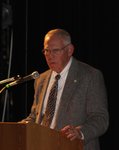LOCH SHELDRAKE — It hasn't happened in half a century, but New Yorkers will go to the polls on November 7 to decide whether or not to hold a State Constitutional Convention.
It's a …
This item is available in full to subscribers.
Please log in to continue |


LOCH SHELDRAKE — It hasn't happened in half a century, but New Yorkers will go to the polls on November 7 to decide whether or not to hold a State Constitutional Convention.
It's a complicated proposition full of unanswered questions, but it has the potential to fundamentally alter government in New York for generations to come.
Nearly 100 people turned out at SUNY Sullivan's Seelig Theater last week to hear both sides of the argument.
Sponsored by the Sullivan County Legislature and organized by District 4 Legislator Catherine Owens, the debate featured SUNY New Paltz Professor Gerald Benjamin arguing in favor of holding a convention, and Michael Gruibiak, regional political director of NYSUT (New York United Teachers) arguing in opposition.
Benjamin began his opening remarks by asking the audience a few rhetorical questions. “Are you satisfied with the persistent experience of having our state leaders indicted, convicted or forced from office for unethical behavior? Are you satisfied with entrenched incumbents continuing in office and selecting their constituents rather than being selected by their constituents because of their egregious gerrymandering of legislative districts? Are you satisfied with a judicial system that's so complex and arcane that it's regarded as the least well organized in the United States?”
Benjamin urged those in attendance who are bothered by these things that a Constitutional Convention would be the only way to affect real and lasting change.
Gruibiak gave a number of reasons why the constitutional debate would be nothing more than “a waste of time and money.”
The 1967 convention cost New York tax payers $47 million. A convention in 2018 or 2019 could cost as much as $75 million, according to most estimates. “$75 million is a lot of money, some days I don't make it,” Benjamin joked. “But that money is to correct a $160 billion organization. If we saved half of what's wasted in the judicial system, we'd cover the cost of a convention three times.”
Gruibiak argued the delegates elected to affect this change would most likely be the same people for whom change is not in their interest, and it could risk weakening our public schools and public employee pensions.
Anything decided by delegates at the convention would first be put to a public referendum before being adopted. Benjamin said New Yorkers were unlikely to approve any measures that threaten public employee pensions.
Gruibiak rejected the idea that a constitutional convention is the only way to achieve real change in the State of New York.
“Since 1898 we have a legislative process to amend our state constitution,” Gruibiak said. “We've done that successfully over 200 times.”
Gruibiak cited the constitutional amendment also on the ballot this year to revoke the pensions of convicted felons who are current elected officials. “I see this as a sign that the legislative process is working. This is ethics reform for the people of New York to decide,” Gruibiak said.
Gruibiak also rejected the idea that the convention would be a “people's convention,” run by ordinary citizens who ran and were elected as delegates.
If New Yorkers vote to have a convention in 2018 or 2019, they would have to elect three delegates from each legislative district. The 204 delegates that would ultimately be elected could include currently elected officials (state senators, assembly people, county executives, etc.)
Each delegate would make a $79,000 salary. Gruibiak warned this could mean paying a delegate's salary on top of an elected officials current salary.
“What we saw in the 1967 convention is a lot of elected officials ran as delegates, made double the salaries, and also received pension and health benefits.” Gruibiak said. “I live in Tarrytown and I would like to run for delegate. If any of my elected officials decide to run, I wouldn't have a chance. I don't have the base of support or the campaign finances that they already possess.”
Benjamin responded that the unions (including NYSUT) are the highest spending organizations in the constitutional convention fight. “Why does every prediction have to be negative?” asked Benjamin. “Why do we assume that when New Yorkers gather to improve their government that only bad things will happen? To condemn the conventions for not doing enough at the same time as we condemn risking a convention that would do too much has a certain internal contradiction. What we're being told is ‘you're chronically ill, live with it!' Well, I don't want to live with it.”
Gruibiak maintained the best, and safest way, to correct the state constitution is through the legislative amendment process.
“I can't assure you with certainty that only good things will come out of this convention,” Benjamin said. “I can assure you that the people in power will not change the fundamentals of government if it means losing some of their power. This process was created to go around them if their behavior is egregious enough to warrant it.”
All the scenarios and implications of a constitutional convention are too numerous to detail at once, but the debate at SUNY Sullivan gave residents a chance to ask questions directly of the experts on both sides.
When you enter the polling booth on that first Tuesday in November, the most important vote you cast might not be for any individual candidate, but to decide whether to initiate this constitutional process.
Comments
No comments on this item Please log in to comment by clicking here